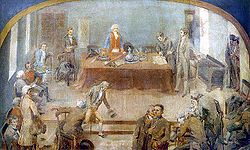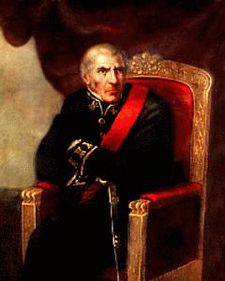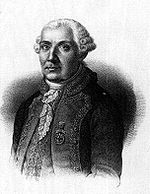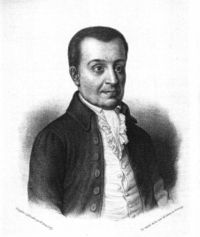
Government Junta of Chile (1810)
Encyclopedia

Chile
Chile ,officially the Republic of Chile , is a country in South America occupying a long, narrow coastal strip between the Andes mountains to the east and the Pacific Ocean to the west. It borders Peru to the north, Bolivia to the northeast, Argentina to the east, and the Drake Passage in the far...
following the deposition and imprisonment of King Ferdinand VII by Napoleon Bonaparte. It was the earliest step in the Chilean struggle for independence, and the anniversary of its establishment is celebrated as the national day of Chile.
Background
At the start of 1808, the Captaincy General of Chile—one of the smallest and poorest colonies in the Spanish EmpireSpanish Empire
The Spanish Empire comprised territories and colonies administered directly by Spain in Europe, in America, Africa, Asia and Oceania. It originated during the Age of Exploration and was therefore one of the first global empires. At the time of Habsburgs, Spain reached the peak of its world power....
—was under the administration of Luis Muñoz de Guzmán
Luis Muñoz de Guzmán
Luis Muñoz de Guzmán was a Spanish colonial administrator who served as Royal Governor of Quito and Royal Governor of Chile.-Sources:...
, an able, respected and well-liked Royal Governor
Royal Governor of Chile
The Royal Governor of Chile ruled over the Spanish colonial administrative district known as the Kingdom of Chile. This district was also called the Captaincy General of Chile, and as a result the Royal Governor also held the title of a Captain General...
. In May 1808 the overthrow of Charles IV
Charles IV of Spain
Charles IV was King of Spain from 14 December 1788 until his abdication on 19 March 1808.-Early life:...
and Ferdinand VII, their replacement by Joseph Bonaparte
Joseph Bonaparte
Joseph-Napoléon Bonaparte was the elder brother of Napoleon Bonaparte, who made him King of Naples and Sicily , and later King of Spain...
and the start of the Peninsular War
Peninsular War
The Peninsular War was a war between France and the allied powers of Spain, the United Kingdom, and Portugal for control of the Iberian Peninsula during the Napoleonic Wars. The war began when French and Spanish armies crossed Spain and invaded Portugal in 1807. Then, in 1808, France turned on its...
plunged the empire into a state of agitation. In the meantime, Chile was facing its own internal political problems. Governor Guzmán had suddenly died on February of that year and the crown had not been able to appoint a new governor before the invasion. After a brief interim regency by Juan Rodríguez Ballesteros, and according to the succession law in place at the time, the position was laid claim to and assumed by the most senior military commander, who happened to be Brigadier Francisco García Carrasco
Francisco Antonio García Carrasco
Francisco Antonio García Carrasco Díaz was a Spanish soldier and Royal Governor of Chile. His political relations with Juan Martinez de Rozas and a smuggling scandal involving the frigate Scorpion destroyed what little authority he had, and required that he surrender his post to Mateo de Toro...
.

Royal Governor of Chile
The Royal Governor of Chile ruled over the Spanish colonial administrative district known as the Kingdom of Chile. This district was also called the Captaincy General of Chile, and as a result the Royal Governor also held the title of a Captain General...
in April and in August the news of the Napoleonic invasion of Spain
Spain
Spain , officially the Kingdom of Spain languages]] under the European Charter for Regional or Minority Languages. In each of these, Spain's official name is as follows:;;;;;;), is a country and member state of the European Union located in southwestern Europe on the Iberian Peninsula...
and of the conformation of a Supreme Central Junta
Junta (Peninsular War)
In the Napoleonic era, junta was the name chosen by several local administrations formed in Spain during the Peninsular War as a patriotic alternative to the official administration toppled by the French invaders...
to govern the Empire in the absence of a legitimate king reached the country. In the meantime, Charlotte Joaquina
Charlotte of Spain
Doña Carlota Joaquina of Spain was a Queen consort of Portugal as wife of John VI...
, sister of Ferdinand and wife of the King of Portugal
John VI of Portugal
John VI John VI John VI (full name: João Maria José Francisco Xavier de Paula Luís António Domingos Rafael; (13 May 1767 – 10 March 1826) was King of the United Kingdom of Portugal, Brazil and the Algarves (later changed to just King of Portugal and the Algarves, after Brazil was recognized...
, who was living in Brazil
Brazil
Brazil , officially the Federative Republic of Brazil , is the largest country in South America. It is the world's fifth largest country, both by geographical area and by population with over 192 million people...
, also made attempts to obtain the administration of the Spanish dominions in Latin America
Latin America
Latin America is a region of the Americas where Romance languages – particularly Spanish and Portuguese, and variably French – are primarily spoken. Latin America has an area of approximately 21,069,500 km² , almost 3.9% of the Earth's surface or 14.1% of its land surface area...
. Since her father and brother were being held prisoners in France, she regarded herself as the heiress of her captured family. Allegedly among her plans was to send armies to occupy Buenos Aires
Buenos Aires
Buenos Aires is the capital and largest city of Argentina, and the second-largest metropolitan area in South America, after São Paulo. It is located on the western shore of the estuary of the Río de la Plata, on the southeastern coast of the South American continent...
and northern Argentina and to style herself as Queen of La Plata
La Plata
La Plata is the capital city of the Province of Buenos Aires, Argentina, and of La Plata partido. According to the , the city proper has a population of 574,369 and its metropolitan area has 694,253 inhabitants....
.
Brigadier García Carrasco was a man of crude and authoritarian manners, who managed in a very short time to alienate the criollo elites under his command. Already in Chile, as in most of Latin America, there had been some independence agitation but very minimal and concentrated in the very ineffectual Conspiracy of the Tres Antonios
Conspiracy of the Tres Antonios
The Conspiracy of the Tres Antonios was minor failed conspiracy against the Spanish colonial authorities in the captaincy-general of Chile, that was led by two Frenchmen, Antonio Gramusset and Antonio Berney, and a criollo, José Antonio de Rojas...
back in 1781. The majority of the people were fervent royalists but were divided into two groups: those who favored the status quo and the divine right of Ferdinand VII (known as absolutists) and those who wanted to proclaim Charlotte Joaquina as Queen (known as carlotistas). A third group was composed of those who proposed the replacement of the Spanish authorities with a local junta of notable citizens, which would conform a provisional government to rule in the absence of the king and an independent Spain (known as juntistas).
In 1809 Governor García Carrasco himself was implicated in a flagrant case of corruption (the Scorpion scandal
Scorpion scandal
The Scorpion scandal was a smuggling, criminal and political scandal that caused the downfall of the Spanish Royal Governor of Chile, and hastened the Independence movement in that country.-Background:...
) that managed to destroy whatever remnants of moral authority he or his office had left. From that moment on the pressure for his removal began to build. In June 1810 news arrived from Buenos Aires that Napoleon Bonaparte's forces had conquered Andalusia
Andalusia
Andalusia is the most populous and the second largest in area of the autonomous communities of Spain. The Andalusian autonomous community is officially recognised as a nationality of Spain. The territory is divided into eight provinces: Huelva, Seville, Cádiz, Córdoba, Málaga, Jaén, Granada and...
and laid siege to Cádiz
Siege of Cádiz
The Siege of Cádiz was a siege of the large Spanish naval base of Cádiz by a French army from February 5, 1810 to August 24, 1812 during the Peninsular War. Following the occupation of Madrid on March 23, 1808, Cádiz became the Spanish seat of power, and was targeted by 60,000 French troops under...
, the last redoubt against the French on Spanish soil. Moreover, the Supreme Central Junta
Junta (Peninsular War)
In the Napoleonic era, junta was the name chosen by several local administrations formed in Spain during the Peninsular War as a patriotic alternative to the official administration toppled by the French invaders...
, which had governed the Empire for the past two years, had abolished itself in favor of a Regency Council. García Carrasco, who was a supporter of the carlotist group, managed to magnify the political problems by taking arbitrary and harsh measures, such as the arrest and deportation to Lima without due process of well-known and socially prominent citizens under simple suspicions of having been sympathetic to the junta idea. Among those arrested were José Antonio de Rojas, Juan Antonio Ovalle and Bernardo de Vera y Pintado.

May Revolution
The May Revolution was a week-long series of events that took place from May 18 to 25, 1810, in Buenos Aires, capital of the Viceroyalty of the Río de la Plata, a Spanish colony that included roughly the territories of present-day Argentina, Bolivia, Paraguay and Uruguay...
in Argentina, thoroughly propagated through the criollo elite. They resented the illegal arrests and, together with the news that Cádiz was all that was left of a free Spain, finally solidified in their opposition to the Governor. Brigadier García Carrasco was suspended from office and forced to resign on July 16, 1810, to be in turn replaced by the next most senior soldier, Mateo de Toro Zambrano Count of la Conquista
Count of la Conquista
Count of la Conquista is an 18th century Spanish hereditary title, famously held by Mateo de Toro Zambrano y Ureta, who was Royal Governor of Chile as well as President of the Government Junta of the Kingdom of Chile, which is generally seen as the first step of Chilean independence.The title was...
, even though a legitimate Governor, Francisco Javier de Elío
Francisco Javier de Elío
Francisco Javier de Elío , was a Spanish military, governor of Montevideo and the last Viceroy of the Río de la Plata. He was also instrumental in the Absolutist repression after the restoration of Ferdinand VII as King of Spain...
, had already been appointed by the Viceroy of Peru.
Count Toro Zambrano was, by all standards, a very unorthodox selection. He was a very old man already (82 years old at the time) and moreover a "criollo" (someone born in the colonies) as opposed to a "peninsular" (someone born in Spain). Immediately after his appointment in July, the juntistas began to lobby him in order to obtain the formation of a junta. In August the Royal Appeals Court took a public loyalty oath to the Regency Council in front of a massive audience, which put added pressure on the Governor to define himself. After vacillating for some time over which party to follow, Toro Zambrano finally agreed to hold an open Cabildo
Cabildo (council)
For a discussion of the contemporary Spanish and Latin American cabildo, see Ayuntamiento.A cabildo or ayuntamiento was a former Spanish, colonial administrative council that governed a municipality. Cabildos were sometimes appointed, sometimes elected, but were considered to be representative of...
(city hall) meeting in Santiago
Santiago, Chile
Santiago , also known as Santiago de Chile, is the capital and largest city of Chile, and the center of its largest conurbation . It is located in the country's central valley, at an elevation of above mean sea level...
to discuss the issue. The date was set for September 18, 1810 at 11 AM.
Members
| Position | Name |
|---|---|
| President | Mateo de Toro Zambrano |
| Vice President | José Martínez de Aldunate Jose Martinez de Aldunate Bishop José Antonio Martínez de Aldunate y Garcés de Marcilla was Chilean Bishop and a member of the First Government Junta of Chile.... |
| Members | Fernando Márquez de la Plata Fernando Márquez de la Plata Fernando Márquez de la Plata y Orozco was a Spanish colonial functionary, and a member of the First Government Junta of Chile.... Juan Martínez de Rozas Juan Martinez de Rozas Juan Martínez de Rozas Correa was the earliest leader in the Chilean struggle for independence.He was born at Mendoza in 1759, the son of Juan Martínez de Soto Rozas and María Prudencia Correa Villegas. In his early life he was a professor of law, theology and philosophy at Santiago... Ignacio de la Carrera Cuevas Ignacio de la Carrera Ignacio de la Carrera y Cuevas was a Chilean aristocrat, member of the First Government Junta of Chile, and father of the Carrera brothers, who were some of the most important leaders of the early Chilean struggles for independence during the period of the Patria Vieja... Colonel Francisco Javier de Reyna Juan Enrique Rosales |
| Secretaries | José Gaspar Marín José Gregorio Argomedo |
Establishment
From the very beginning the juntistas took the political initiative. They were able to place their members in charge of sending the invitations, thus manipulating the assistance lists to their own advantage. At the September 18th session, they grabbed center stage with shouts of "¡Junta queremos! ¡junta queremos!" ("We want a junta! We want a junta"). Count Toro Zambrano, faced with this very public show of force, acceded to their demands by depositing his ceremonial baton on top of the main table and saying "Here is the baton, take it and rule". The discussion ended with the establishment of the Government Junta of the Kingdom of Chile, also known as the First Junta, which was organized with the same powers held by a Royal GovernorRoyal Governor of Chile
The Royal Governor of Chile ruled over the Spanish colonial administrative district known as the Kingdom of Chile. This district was also called the Captaincy General of Chile, and as a result the Royal Governor also held the title of a Captain General...
. In the discussion triumphed the idea of a local independent government as opposed to the monarchist idea of submitting themselves to the control of the Regency Council. Nonetheless, this idea of "independence" must not be taken in the modern sense. This junta never intended to sever the relationship with the monarchy, but was only taking advantage of the possibility to assert local rule.
Administrative measures
Their first measure was to take a formal loyalty oath to Ferdinand VII as legitimate King. Count Toro Zambrano was elected President, and the rest of the positions were distributed equally among all parties, but the real power was left in the hands of the secretary, Juan Martínez de RozasJuan Martinez de Rozas
Juan Martínez de Rozas Correa was the earliest leader in the Chilean struggle for independence.He was born at Mendoza in 1759, the son of Juan Martínez de Soto Rozas and María Prudencia Correa Villegas. In his early life he was a professor of law, theology and philosophy at Santiago...
. The Junta then proceeded to take some concrete measures that had been long-held aspirations of the colonials: it created a militia for the defense of the kingdom, decreed freedom of trade with all nations that were allied to Spain or neutrals, a unique tariff of 134% for all imports (with the exception of printing presses, books and guns which were liberated from all taxes) and in order to increase its representativity, ordered the convocatory of a National Congress.
Immediately, political intrigue began amongst the ruling elite, with news of the political turbulence and wars of Europe
Peninsular War
The Peninsular War was a war between France and the allied powers of Spain, the United Kingdom, and Portugal for control of the Iberian Peninsula during the Napoleonic Wars. The war began when French and Spanish armies crossed Spain and invaded Portugal in 1807. Then, in 1808, France turned on its...
all the while coming in. It was eventually decided that elections for the National Congress, to be composed of 42 representatives, would be held in 1811. By March of that year 36 representatives had already been elected in all major cities with the exception of Santiago and Valparaíso
Valparaíso
Valparaíso is a city and commune of Chile, center of its third largest conurbation and one of the country's most important seaports and an increasing cultural center in the Southwest Pacific hemisphere. The city is the capital of the Valparaíso Province and the Valparaíso Region...
.
Political tendencies

Juan Martinez de Rozas
Juan Martínez de Rozas Correa was the earliest leader in the Chilean struggle for independence.He was born at Mendoza in 1759, the son of Juan Martínez de Soto Rozas and María Prudencia Correa Villegas. In his early life he was a professor of law, theology and philosophy at Santiago...
, due to the illness of the Vice President, Bishop José Martínez de Aldunate
Jose Martinez de Aldunate
Bishop José Antonio Martínez de Aldunate y Garcés de Marcilla was Chilean Bishop and a member of the First Government Junta of Chile....
, (who was to die on April 8, 1811).
Three political tendencies were starting to appear: the extremists, the moderates and the royalists. These groups were all decidedly against independence from Spain
Spain
Spain , officially the Kingdom of Spain languages]] under the European Charter for Regional or Minority Languages. In each of these, Spain's official name is as follows:;;;;;;), is a country and member state of the European Union located in southwestern Europe on the Iberian Peninsula...
and differentiated themselves only in the degree of political autonomy that they sought. The moderates , under the leadership of José Miguel Infante
José Miguel Infante
José Miguel Infante y Rojas was a Chilean statesman and political figure. He served several times as deputy and minister, and was the force behind the Federalist movement in that country.-Early life:...
, were a majority, and wanted a very slow pace of reforms since they were afraid that once the King was back in power he would think that they were seeking independence and would roll-back all changes. The exaulted were the second most important group and they advocated a larger degree of freedom from the Crown and a faster pace of reforms stopping just short of full independence. His leader was Juan Martínez de Rozas. The royalists were against any reform at all and for the maintenance of the status quo.
Figueroa Mutiny
The great political surprise up to that point had been the results from the other center of power, ConcepciónConcepción, Chile
Concepción is a city in Chile, capital of Concepción Province and of the Biobío Region or Region VIII. Greater Concepción is the second-largest conurbation in the country, with 889,725 inhabitants...
, in which royalists had defeated the supporters of Juan Martínez de Rozas
Juan Martinez de Rozas
Juan Martínez de Rozas Correa was the earliest leader in the Chilean struggle for independence.He was born at Mendoza in 1759, the son of Juan Martínez de Soto Rozas and María Prudencia Correa Villegas. In his early life he was a professor of law, theology and philosophy at Santiago...
. In the rest of Chile, the results were more or less equally divided: twelve pro-Rozas delegates, fourteen anti-Rozas and three royalists. So, the Santiago elections were the key to Rozas' desire to remain in power. This election was supposed to take place on April 10, but before they could be called the Figueroa mutiny
Figueroa mutiny
Figueroa mutiny was a failed attempt to restore royal power and is the first coup d'état to ever take place in Chile.- Background :...
broke out.
On April 1, the royalist colonel Tomás de Figueroa—considering the notion of elections to be too populist—led a revolt in Santiago. The revolt sputtered, and Figueroa was arrested and summarily executed. The mutiny was successful in that temporarily sabotaged the elections, which had to be delayed. Eventually, however, a National Congress
National Congress of Chile
The National Congress is the legislative branch of the government of the Republic of Chile.The National Congress of Chile was founded on July 4, 1811...
was duly elected, and all 6 deputies from Santiago came from the moderate camp. Nonetheless, the mutiny also encouraged a radicalization of political postures: even though moderates advocating only greater autonomy of the elites from Spanish Imperial control—without a complete rupture—gained the majority of seats, a vocal minority was formed by excited revolutionaries who now wanted complete and instant independence from Spain.
As a consequence of the mutiny, Martinez de Rozas was replaced on April 2, 1811 by Fernando Márquez de la Plata
Fernando Márquez de la Plata
Fernando Márquez de la Plata y Orozco was a Spanish colonial functionary, and a member of the First Government Junta of Chile....
. The Royal Appeals Court, a long-standing pillar of support of the Spanish Crown, was dissolved for its alleged "complicity" and the idea of full independence gained momentum for the first time. The Junta lasted until July 4, 1811, when it was replaced by the National Congress
National Congress of Chile
The National Congress is the legislative branch of the government of the Republic of Chile.The National Congress of Chile was founded on July 4, 1811...
, and later by the Second Junta
Government Junta of Chile (August 1811)
Government Junta of Chile , also known as the Executive Junta or the Second Government Junta, was the organ established to rule Chile following the convocatory of a National Congress.-Background:...
.
See also
- Chilean War of Independence
- Figueroa mutinyFigueroa mutinyFigueroa mutiny was a failed attempt to restore royal power and is the first coup d'état to ever take place in Chile.- Background :...
- History of ChileHistory of ChileThe territory of Chile has been populated since at least 2,000 BC. By the 16th century, Spanish conquistadors began to subdue and colonize the region of present-day Chile, and the territory became a colony from 1540 to 1818, when it gained independence from Spain...
- List of Government Juntas of Chile
- List of Heads of State of ChilePresident of ChileThe President of the Republic of Chile is both the head of state and the head of government of the Republic of Chile. The President is responsible of the government and state administration...
- Junta (Peninsular War)Junta (Peninsular War)In the Napoleonic era, junta was the name chosen by several local administrations formed in Spain during the Peninsular War as a patriotic alternative to the official administration toppled by the French invaders...

